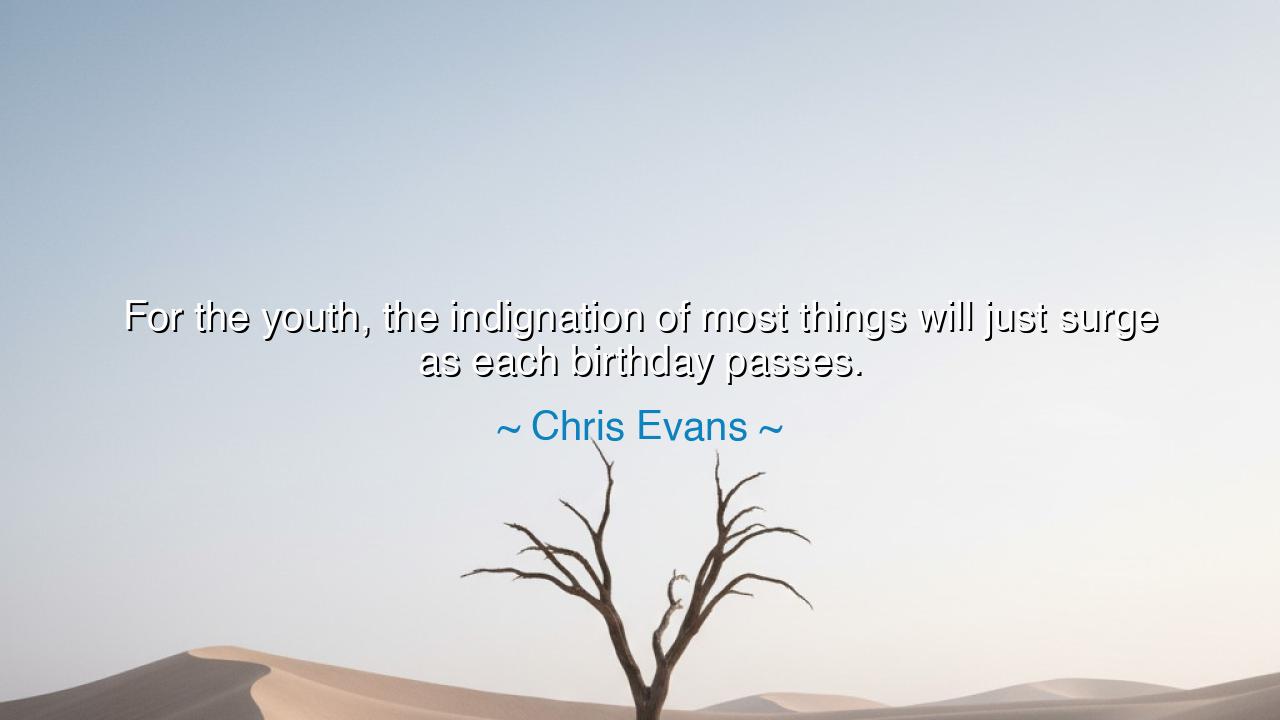
For the youth, the indignation of most things will just surge as






Host: The café was calm, the low hum of conversations blending with the occasional clink of coffee cups. The afternoon light streamed softly through the windows, casting a golden glow across the table where Jack and Jeeny sat. Jack seemed lost in thought, his fingers tracing the rim of his coffee cup. Jeeny, noticing his mood, waited for him to speak.
Host: After a brief pause, Jack looked up, his voice thoughtful.
Jack: “I came across a quote from Chris Evans today. He said, ‘For the youth, the indignation of most things will just surge as each birthday passes.’ It made me think about how, when we’re younger, we often feel a strong sense of injustice about the world — everything seems wrong or unfair. But as we get older, that anger can sometimes fade, or we find ways to cope with it. Do you think that’s true? That as we age, our sense of indignation changes, or maybe even becomes more controlled?”
Jeeny’s eyes softened, her voice calm but filled with insight as she responded.
Jeeny: “I think Evans’ quote touches on a really interesting part of growing up. When we’re younger, everything feels so intense — our beliefs, our frustrations, our sense of injustice — because we haven’t yet developed the coping mechanisms or the experience to understand the complexity of the world. Youth often sees things in black and white. As we get older, we start to realize that the world isn’t so easily categorized, and while that doesn’t mean we stop feeling passionate about the issues, we may find more mature or effective ways to channel that energy. The indignation might not fade, but it shifts — it becomes more refined and less impulsive.”
Host: Jack nodded slowly, clearly reflecting on her words. The quiet of the café seemed to deepen as he thought about how growing older often changes how we approach life’s challenges.
Jack: “So, it’s not that we become less passionate or caring, but that we start to understand the complexities more. As we grow, we find that it’s not always as simple as just being angry about something — there are layers and nuances to address.”
Jeeny smiled gently, her eyes steady with understanding as she responded.
Jeeny: “Exactly. Indignation doesn’t have to go away, but it can evolve into something more thoughtful and strategic. We might start looking for ways to actually change things, rather than just feeling upset. And sometimes, with age, we learn that some things aren’t as immediately urgent as they seemed when we were younger, but that doesn’t mean we stop caring. We just learn to pick our battles a bit more wisely.”
Host: Jack leaned back, a small smile forming as the realization sank in. The world outside the café continued its usual rhythm, but inside, their conversation had opened up a deeper perspective on indignation and growth.
Jack: “So, as we age, maybe our indignation isn’t about losing that fire but about learning how to focus it in a way that’s more effective. We don’t stop caring, but we start channeling that energy in a more constructive way.”
Jeeny nodded, her smile warm with affirmation.
Jeeny: “Exactly. Indignation can fuel growth and change, but as we age, we become more thoughtful in how we respond to it. The intensity may change, but the passion for justice and improvement can remain just as strong, even if it’s expressed in a more nuanced way.”
Host: The conversation seemed to linger in the air, a quiet understanding between them that growing older doesn’t mean losing passion, but rather learning how to engage with the world more intelligently and strategically. Jack and Jeeny shared a deeper appreciation for how our responses to life’s injustices evolve over time. The world outside continued on, but inside the café, there was a renewed respect for the way age and experience can shape the intensity of our feelings without diminishing their importance.






AAdministratorAdministrator
Welcome, honored guests. Please leave a comment, we will respond soon